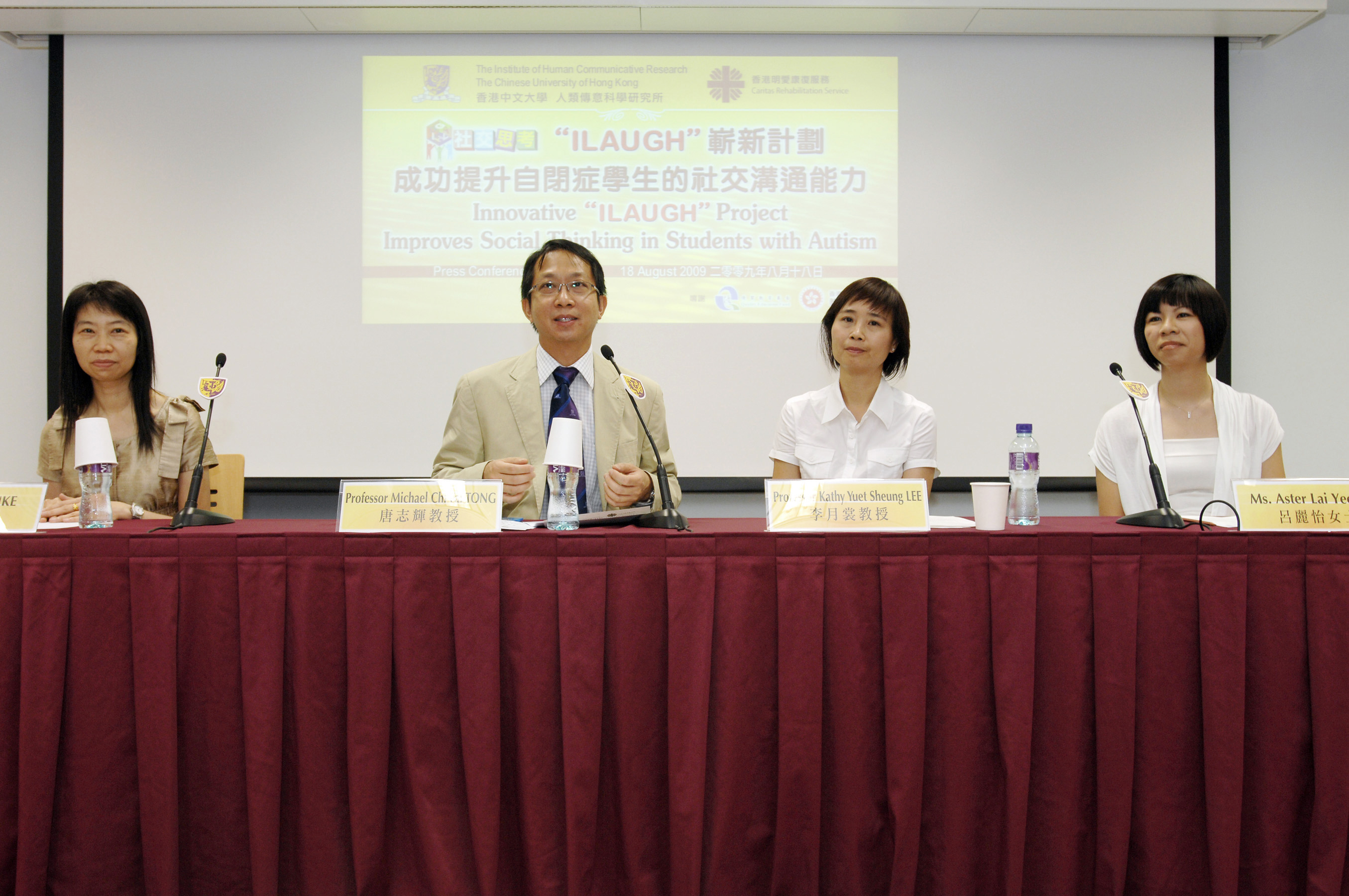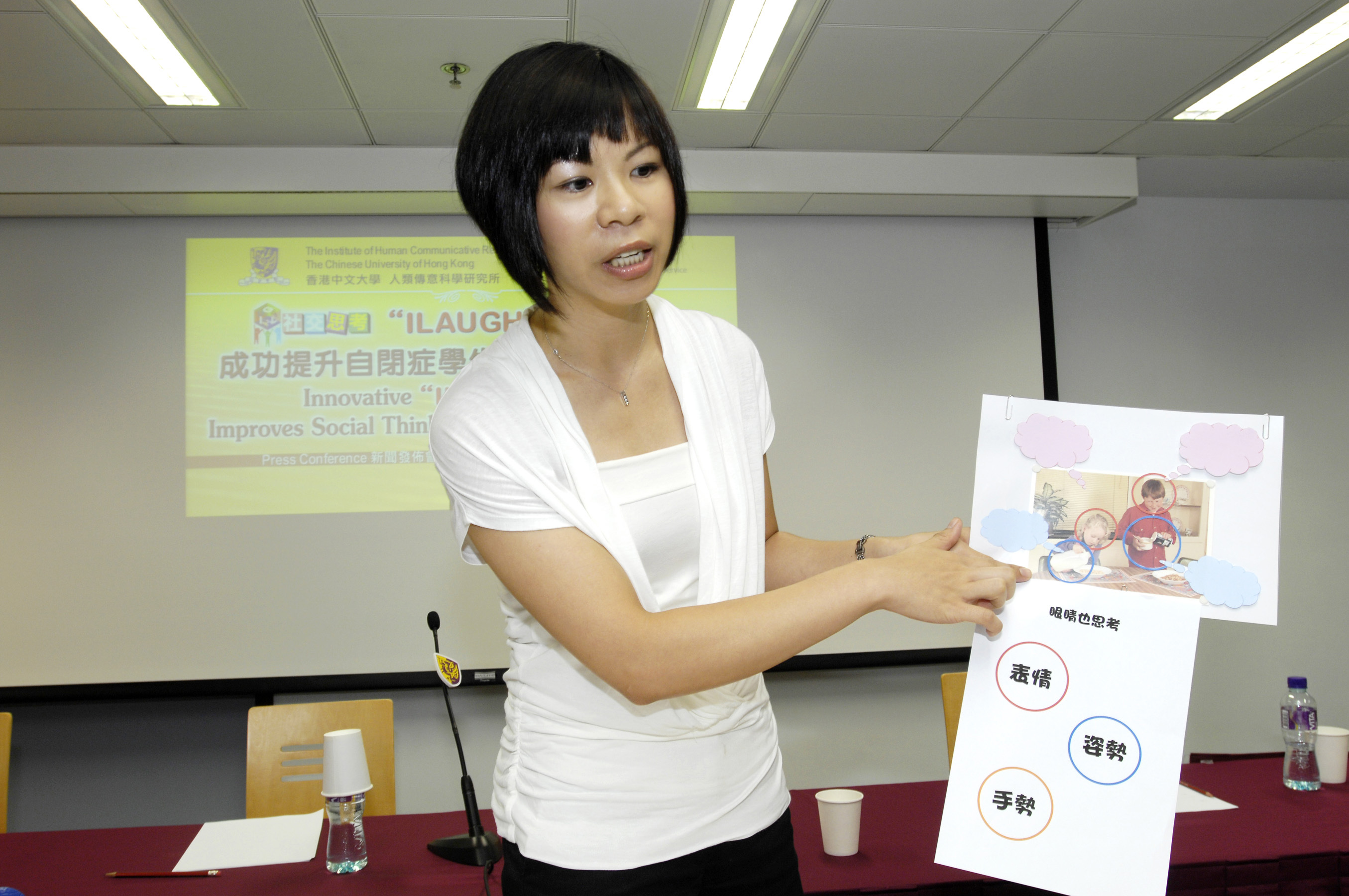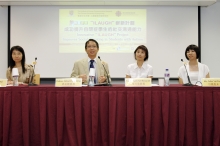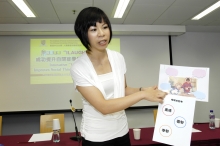CUHK
News Centre
Innovative ‘ILAUGH’ Project Improves Social Thinking of Autistic Students
A joint project conducted by the Institute of Human Communicative Research at The Chinese University of Hong Kong (CUHK) and the Caritas Rehabilitation Service sees positive results for students with autism. Funded by the Quality Education Fund and supported by the Education Bureau, it shows that a group of Hong Kong secondary school students who had been diagnosed with or was suspected of having autism has improved significantly in social communication ability after taking part in a dynamic new social thinking training programme known as ‘ILAUGH’.
The name ‘ILAUGH’ highlights the positive improvements in social relationships and general impacts of the training. It also offers an easily remembered way of grouping social thinking skills like learning about sharing space with others, considering others’ points of view, and understanding emotions, thoughts, beliefs, prior knowledge and intentions into six key areas:
I Initiation of communication
L Listening with eyes and brain
A Abstract and inferential thinking
U Understanding perspective
G Gestalt processing / getting the ‘big picture’|
H Humour and human relatedness
Much training in social skills has tended to teach a child just to memorize and activate a specific response with respect to a rather broad social circumstance so far, eg. saying ‘Good morning’ to anyone they happen to meet in the morning. By contrast, ILAUGH is more nuanced and better grounded in social reality. It encourages students to observe the complex world around them in their schools and their daily lives from multiple perspectives. It leads them to reflect more fully on other peoples’ thoughts and feelings and helps them respond and act more appropriately.
To elaborate the earlier example, a student in the ILAUGH programme will not only decide, use and practice the right tone of voice, facial expression, and gesture when she says ‘Good morning’. She will also learn how to deliver this greeting to different people in various settings, e.g. a playground encounter, a morning assembly or a class meeting, each of which will call for distinct differences in performance.
The six interrelated elements of ILAUGH are proved to be particularly effective in helping students to sense and act upon the hidden meanings behind messages and situations. They can then successfully reshape their behaviours and ultimately live more happily and harmoniously with the others.
ILAUGH is delivered by a multidisciplinary team including academia, speech language pathologists, occupational therapists, social workers and educators. In the initial phase between November 2007 and June 2008, 12 ILAUGH training sessions were delivered to 44 students from 14 schools in small groups of three to four students.
A 70-item 5-point rating scale was used to measure social behaviour appropriateness among the students before and after the training. The total average score rose from 2.81 to 3.17, representing a 12.8% increase, statistically significant at the p = <0.001 level. Post-training improvements were shown across each of the six aspects of ILAUGH.
Parents, teachers and social workers of the students also reported that they were satisfied with the training results. They felt that the students had shown great improvements in interpersonal relationships, caring for the family and academic performance.
While social thinking is quite natural and obvious to most so-called ‘normal’ or ‘neurotypical’ children and adults, it can be really difficult for people with autism. A toddler with autism cannot readily tell from his parents’ facial expression and tone of voice if he may touch a particular object. An adult with autism may not get the message that one is in a hurry or has lost interest in the conversation if he keeps looking at his watch. ‘As social thinking ability in people with autism is not effectively hard-wired at birth, it cannot be learned intuitively as one develops,’ said Professor Kathy Lee, Assistant Director of the Institute of Human Communicative Research, CUHK. ‘This is why programmes on the carefully researched lines of ILAUGH are so essential.’
According to a 2008 report of the Census and Statistics Department, the prevalence of autism in Hong Kong is 0.1%. Among those with autism, 74.7% said they found day-to-day living and school learning difficult. Questionnaires sent by the ILAUGH working group to 436 teachers revealed that students with autism often failed to establish peer relationships. They also experienced emotional disturbances, conflicts with their classmates or teachers, teasing, rejection or bullying.
The ILAUGH working group is very pleased to launch this meaningful programme to secondary schools. In a complementary initiative, it has published The Six Dimensions of Social Thinking: ILAUGH Practical Handbook. This handbook gives teachers, social workers and counselling professionals a deeper understanding of the social communication difficulties faced by young people with autism. All secondary schools in Hong Kong will soon receive a copy of this handbook from the Education Bureau. ILAUGH has also published a free introductory pamphlet on ILAUGH Social Thinking. Interested parties can download it at the following link: www.ihcr.cuhk.edu.hk/events/pdf/ILAUGH_booklet_pdf-3.pdf
From a formal diagnostic perspective, the American Psychiatric Association’s DSM-IV criteria for autism (autistic disorder) include three main areas of difficulty: impairments in social interaction; impairments in communication; and restricted repetitive and stereotyped patterns of behaviour, interests, and activities. Autistic disorder is regarded as a complex developmental disability that appears during the first three years of life and is the result of a neurological disorder affecting brain function.
(Left) Ms. Kit Ling LUKE, Center Supervisor, Caritas Rehabilitation Service; Professor Michael Chi Fai TONG, Associate Director; The Institute of Human Communicative Research; Professor Kathy Yuet Sheung LEE, Assistant Director, The Institute of Human Communicative Research, and Ms. Aster Lai Yee LUI, Speech Therapist, The Institute of Human Communicative Research, CUHK







